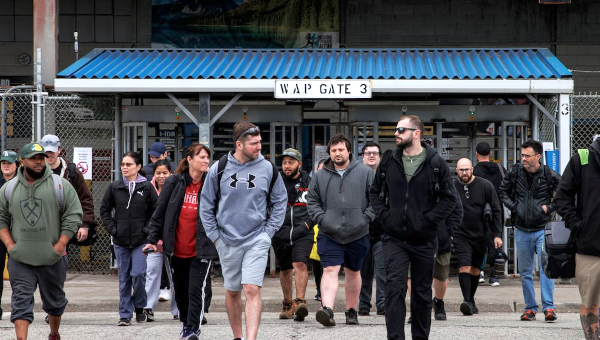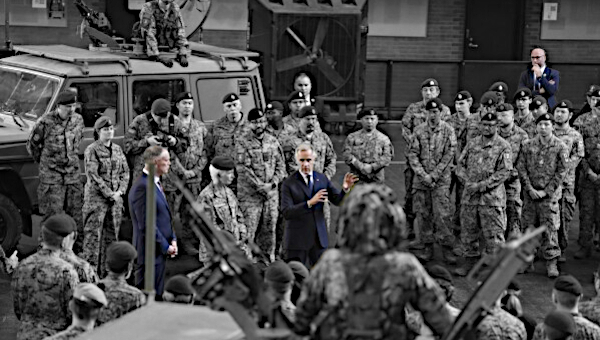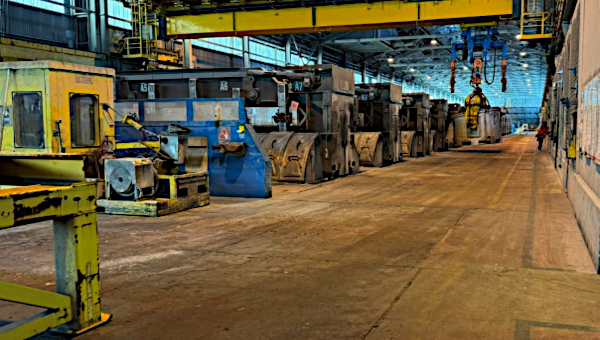NDP, and Working People, Lose Out In BC Election
“My fear is that we may end up with a legislature that is almost completely irrelevant to the next generation of British Columbians.” – David Mitchell, head of the national Public Policy Forum commenting on the May 12, 2009, British Columbia election.
The May 12 provincial election in British Columbia has left a lot of working people shaking their heads in dismay. A right-wing, anti-environment, and anti-working class government was able to win a third successive term in office, by a comfortable margin no less.
How could the opposition New Democratic Party (NDP) and the 450,000-member BC Federation of Labour which backs the party fail to unseat the unpopular, if not reviled, Liberal Party government under Premier Gordon Campbell?
Where have the voters gone?
The election result is very close to that of 2005. The Liberal and NDP share of the popular vote did not change, at 46% and 42% respectively. The Liberals won 49 seats in the Legislature, compared to 36 for the NDP. The Green Party won eight percent of the vote.
Voter participation dropped sharply. When the final numbers are in, they will show that only 53% of registered voters cast a ballot, some 1.632 million, compared to 62% in 2005.
All three main parties – Liberals, NDP and Green – received fewer votes compared to 2005. The Liberal and NDP vote dropped by 11%; the drop for the Greens was 23%.
Voter turnout in the Vancouver metropolitan area was below average, notably in ridings with high immigrant populations.
Participation numbers are even lower when statistically eligible voters are considered. Only half of eligible voters took part. Voter participation was lowest for the 18-24 age group. Figures for 2009 are not yet available, but in 2005 only 35% of those eligible in this age group voted.
NDP shift to the right
NDP leader Carole James and her party presented very few policy proposals during the election campaign. There were only two in the social realm – to raise the minimum wage to $10 per hour, and to build several thousand units of social housing during the four-year term in office the party hoped to win.
All other commitments were vague and couched in the language of “reviewing” policies of the preceding regime. Thus, the NDP policy book advocated a “freeze” on post-secondary tuition fees and daycare fees, not the fee reductions that activists are demanding. In the dying days of the campaign, James warned that all proposals in the NDP platform would be subject to a careful examination of the province’s public finances once the party gained office. She reminded voters of her devotion to the dogma of “balanced budgets.”
The most discussed issue in the election was what to do, if anything, about climate change. The NDP and Liberals claimed the same objective – reducing greenhouse gas emissions in the province by 30% by the year 2020, using the year 2007 as a base reference. But two programs promoted by the Liberals and supported by the NDP make a mockery of any talk of reducing greenhouse gas emissions – the multi-billion dollar “Gateway” road, rail, and port expansion under way in the Vancouver metropolitan region; and massive expansion of oil and natural gas production in the northeast of the province.
The NDP staked much of its electoral hopes on its declared opposition to a modest tax on gasoline introduced by the Liberals in 2008 in the name of fighting greenhouse gas emissions, a so-called carbon tax. The NDP’s “axe the tax” campaign appears to have lost more votes among people concerned about the environment than it won among those angered by increasing taxes on energy consumption. (For a background article on the “greenwashing of politics in British Columbia, see Socialist Voice).
The NDP had nothing to offer to workers that are hard hit by the deepening world economic crisis. Employment in the province’s largest industry, forestry, has been devastated by a combination of the collapse of the U.S. housing market, climate change, and provincial government policies favoring raw log exports over local processing of timber. The NDP’s only answer was to suggest the crisis will be overcome with prudent government management of public finances.
In response to public concerns regarding criminal violence fueled by the illegal trade in drugs, the NDP staked out a position to the right of the Liberals, calling for more police and tougher laws against illegal drugs.
Carole James made great efforts throughout the election campaign to ease the worries of the province’s business elite over the possible election of her party. In a speech to the Business Council of BC on March 29, she said, “Even when we do disagree, it is important to acknowledge that we have the best interests of the province at heart. I know the BC Business Council does….”
But her soothing words did not stop the Business Council and its affiliates from issuing harsh advertisements in the closing days of the election campaign warning that the election of the NDP would be a disaster for the “BC economy” and cause tens of thousands of jobs to be lost.
In the days following the election, NDP leaders expressed satisfaction with their campaign. MLA Michael Farnworth, the party’s Opposition House Leader, said, “It makes a good base for 2013,” when the next provincial election is scheduled.
James changed that tune on May 20 when she admitted that she and her party had failed to present a positive vision for the future to the electorate. The failure is not accidental. It’s the product of a five-year effort by James and other party leaders to steer the NDP to the right and to separate even further from affiliated trade unions and from the social movements that have arisen in response to the deepening capitalist crisis.
Where were the trade unions and social movements?
There were very few public protests against the Liberal record in office during the campaign. Liberal candidates were able to waltz through public appearances and debates in communities that have been devastated by their policies.
It was especially galling to see this played out in forest communities. In many, industry unemployment is near total. And forest companies are taking advantage of the economic uncertainty. Catalyst Paper has told four communities on coastal BC where it operates paper mills that it will not pay the $21-million it owes in municipal taxes for the year 2008. It says the towns must either accept its offer of $6-million or it will shut down one of the four mills.
Two significant protests did take place. On April 4, several thousand people rallied in Vancouver to demand that the federal and provincial governments commit to build social housing and end homelessness. And throughout the election, opponents of privatizing electricity generation in the province publicized their cause.
Several NDP candidates and one NDP member of Parliament attended the housing protest.
The BC Federation of Labour has for several years been campaigning for a rise in the minimum wage to $10 per hour. Not a single rally for this campaign took place during the election.
The Federation and the NDP ignored the “Living Wage” campaign launched last year by the Hospital Employees Union. This campaign is giving voice to the 8,000 hospital workers who lost their jobs to privatization in the wake of the defeat of the 2004 strike of hospital workers. The campaign is demanding a wage of $16.74 an hour for hospital service workers and all other poorly paid workers.
Nowhere in the NDP platform was there mention of undoing the harsh and punitive privatizations of services such as hospital cleaning and food services that occurred under the Liberals. These health care workers, and other workers in health, social and government services, toil for poverty or near-poverty wages. For many, their job security has vanished because of the abolition of successor rights that preserved collective agreements if a public authority switches the private providers with which it contracts.
The scandalous conditions affecting the approximately 200,000 Indigenous people in the province received little attention in this election. In 2002, the newly-elected Liberal government staged a racist referendum, asking voters whether they approved the government taking a hard line against self-determination and land rights for Indigenous peoples. It received the mandate it wanted, and has blocked meaningful progress ever since.
More recently, the government has softened the edges of its policy by reaching out to Indigenous leaders or local councils to strike deals that would allow resource industry investment to proceed without the troubling barriers of sovereignty rights.
The NDP and the unions opposed a referendum for an electoral reform that would have been a small but important step for greater political democracy. A form of proportional representation known as “Single Transferable Vote” went down to defeat because of widespread misrepresentation or ignorance about its progressive features.
The war on labour
The Liberals’ reign has been a ceaseless assault on workers jobs and living conditions. In 2002, they tore up existing collective agreements in health care, education and government services. In 2004, a strike of hospital workers was defeated and nearly ten thousand workers in cleaning and food preparation services were replaced by low-wage workers working in precarious, privatized services.
Workers throughout government, health care and education services have seen their salaries, jobs or work conditions similarly degraded. Only teachers were able to withstand the worst of the onslaught, thanks to a militant strike in 2005 that won widespread support.
The poorest and most marginal workers have suffered the most. The minimum wage has been frozen at $8 per hour since 2001. The Liberals even lowered it, to $6 for the first 500 hours of new hires. Homelessness has risen in all urban areas, thanks to the federal and provincial government abandoning spending and responsibility for social housing.
Attacks on workers rights will now deepen following the Liberals’ re-election and as the decline of the provincial economy accelerates.
One front of this will be violations of democratic rights associated with the Winter Olympic Games, to be held in Vancouver in February 2010. For many, the Games symbolize so much of what has gone wrong in the province. While billions of dollars are being lavished on facilities and services for this two-week sporting spectacle, poverty has steadily risen.
A key part of staging the Games will be a massive police crackdown on political protest and on poor people living on the margins of society. Military exercises have already taken place in the skies and waters surrounding Vancouver. Municipal bylaws prohibiting petty conduct such as spitting on sidewalks are being dusted off so that marginalized people accused of repeat violations can be barred from parts of the city that have high visibility to Olympics tourism.
Building a movement for social change
How can working people win a government that defends democratic rights and social justice? This is a question on the minds of many in the wake of this latest, lamentable electoral outcome. The election provides some clear answers to that question that should be discussed throughout the trade unions, social movements, and NDP in the months ahead.
- Right-wing governments with universal backing from the capitalist class, such as that enjoyed by the BC Liberals, cannot be defeated through electoral routine. The electoral process and the surrounding mechanisms of big-business media are too strongly weighted against working people for the simple casting of a ballot to bring about meaningful change.
- A party of the working class must firmly defend the interests of its constituency. The NDP and the unions will never convince big business leaders to join the rest of the human race in making the world a better place. Capitalist and working-class interests run in opposite directions. The social and political organizations of working people need to organize accordingly.
- The fight for social justice and progressive government can only be advanced by bringing the social power of workers and our allies into action, through political education, street mobilizations, workplace actions, and all other forms of popular action. A party of the working class must be active and mobilized throughout the year, not just in time of elections.
NDP members and unions affiliated to the party should organize to challenge the party and the unions to adopt such a perspective.
Socialists and other working-class fighters face the challenge of raising our voices and program more forcefully. The voices of socialism were heard only faintly during this election. Fresh approaches to political organization and greater left unity are overdue. •





